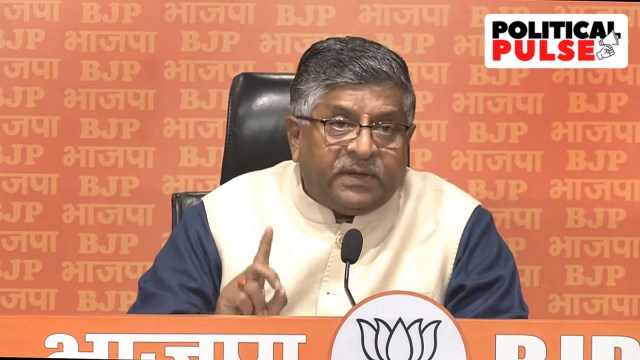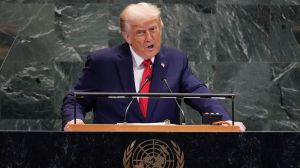“This decision was undertaken with the laudable objective of transparency in electoral funding and reducing cash influence… Those who give donations say it is good if some secrecy is maintained. This isn’t unnatural. If another government comes, it could go after them. So, if someone is honestly doing business, we thought let them do so,” BJP leader Ravi Shankar Prasad said, addressing a press conference at the party headquarters.

Off the record, party leaders said that while the Supreme Court order scrapping the electoral bonds scheme was a setback, particularly “a moral one”, the BJP did not expect it to have much of an impact on the ground.
Story continues below this ad
The Opposition may use the revelations of donors and recipients which will come out now as ammunition to attack the government, BJP leaders said, particularly if some of the donors were found to be corporates seen as having gained unduly under the Modi government or to be involved in irregularities.
However, the BJP believes that in public perception, it might not skew the scales too much as the world of political funding has always been opaque, and ruling parties have always benefited more. “The verdict will not have any major impact on the electorate nor will it hit our resources badly. But certainly, the Opposition would use it to attack the government,” a senior BJP leader and MP said.
At the press conference, Prasad stressed that the electoral bonds scheme was part of attempts “to make the electoral process transparent”. Listing the introduction of voter ID cards with photos and EVMs, he said: “The state where I come from (Bihar) once saw people die in poll violence, but that is a thing of the past now. This (electoral bonds) was another attempt.”
The BJP was reading the judgment, delivered by a Constitution Bench and running into hundreds of pages, carefully and would come out with a detailed response later, Prasad said, adding that the party respected the Court.
Story continues below this ad
Instead, he took a swipe at the Opposition, particularly the Congress, saying the BJP did not need any lessons from it. “As for the Congress, those whose DNA is made of corruption and bribery, please don’t make such allegations against the BJP. And as for (talk of a) level-playing field, the question is whether you are in the field or outside it?” Prasad said, alluding to the Congress’s shrinking political footprint.
“If you are outside it, whom does the level-playing field refer to? People decide whether you are in the field. Those whom the people have expelled from the field talk about a level-playing field. There are those who don’t get a single seat in regions they were once influential… you know whom I am referring to,” he said.
BJP national vice-president Baijayant Jay Panda posted that the scheme was “infinitely better” than what it replaced – “suitcases of illicit cash”. Alleging that often the cash could be traced to drugs and arms smuggling, Panda wrote on X: “Bonds addressed the issue of legitimacy (all donors are registered entities under high levels of regulatory scrutiny). While wanting even higher levels of traceability may be desirable, donors were skittish, making it impractical.”
In a swipe at the Opposition, Panda added that the data on bonds “demonstrates comprehensively that no party has faced discrimination, including & especially those who have seen a drastic reduction in public support”. He regretted that “the perfect has become the enemy of the good” and “the baby has been thrown out along with the bath water”.
Story continues below this ad
The electoral bonds data shows that the gap between the BJP and other parties is stark. In the first financial year from when the electoral bonds were introduced, 2018-19, till 2022-23, the BJP got 46% of its income from electoral bonds, as per the annual audit report submitted by it to the Election Commission. Altogether, 55% of the total electoral bonds sold in this period went to the BJP.
A senior leader said: “An avenue was created, and used. Jo dene wala hain woh denge, aur jo lene wale hain woh lenge (Those who want to give, they will give; and those who are the recipient, will receive)… The optics is bad, but the issue won’t snowball into something as big as to influence votes.”
The BJP is also set to argue that the Supreme Court verdict would bring back the practice of donations through cheque. “It will promote the practice by some parties of diverting funds to NGOs, which hire party employees as staff and then act as their agents,” a leader said.
Senior leaders ruled out the BJP taking the ordinance route, pointing to the difficulty of this given that the general elections are just weeks away. “Moreover, the court has declared the changes made to the law to effect the electoral bonds scheme as ‘unconstitutional’. It makes the government’s options lesser and tougher,” said a Union minister.
Story continues below this ad
In the next few days, the government is expected to discuss the judgment with legal experts thoroughly to explore the options available.


































